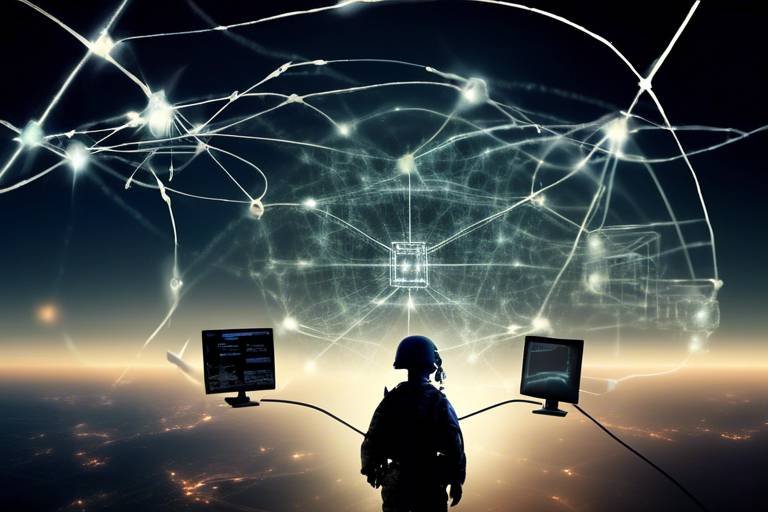Exploring the Role of Cyber Warfare in National Defense
In today's hyper-connected world, the landscape of warfare has evolved dramatically. Gone are the days when battles were fought solely on land, sea, or air. Now, the digital realm has emerged as a crucial front in national defense, leading to the rise of cyber warfare. This article delves into the significance of cyber warfare in modern national defense strategies, examining its implications, techniques, and the evolving landscape of security in the digital age.
Understanding how cyber warfare has developed over the years is crucial. It all began in the late 20th century, when the internet started to gain traction. The first notable instance of cyber warfare can be traced back to the early 1980s, with the creation of the "Mafiaboy" hacker incident, which demonstrated the potential for disruption. Fast forward to the 21st century, and we see a plethora of incidents that have shaped our understanding of cyber warfare, including the infamous Stuxnet attack in 2010, which targeted Iran's nuclear facilities. As technology has advanced, so too have the tactics and strategies employed by both attackers and defenders in this new battlefield.
Identifying the main actors in cyber warfare is essential to grasp its complexities. The key players include:
- Nation-States: These are often the most sophisticated and well-resourced actors, employing cyber operations for strategic objectives.
- Hacktivists: Individuals or groups who use hacking to promote political agendas or social change.
- Criminal Organizations: These groups engage in cybercrime for financial gain, often blurring the lines between traditional crime and warfare.
Each of these players has unique motivations and capabilities, significantly impacting national security. Understanding their roles can help nations devise effective strategies to counteract potential threats.
Nation-states engage in cyber warfare with a variety of strategic objectives in mind. These can range from gathering intelligence to disrupting critical infrastructure. The tactics employed can include:
- Distributed Denial of Service (DDoS) attacks
- Data breaches and espionage
- Manipulation of public perception through misinformation
Notable examples of state-sponsored cyber attacks include the 2007 cyber assault on Estonia and the 2016 hacking of the Democratic National Committee in the United States. These incidents illustrate how cyber warfare can be used to achieve political goals without firing a single shot.
Cyber espionage has become a prevalent tactic among nations, allowing them to gather sensitive information without traditional means of surveillance. This section examines its methods, targets, and the consequences of such activities on international relations. Cyber espionage typically involves infiltrating a target's network to steal data or monitor communications. The targets can include government agencies, corporations, and even individuals with access to valuable information. The implications of successful cyber espionage can be profound, leading to strained diplomatic relations and heightened tensions between nations.
In response to the growing threat of cyber warfare, nations have developed various defense strategies. These include:
- Establishing dedicated cybersecurity agencies
- Implementing advanced encryption technologies
- Conducting regular security audits and training
By employing a multi-layered approach to cybersecurity, nations can better safeguard their interests and mitigate the risks associated with cyber threats.
Hacktivism represents a unique form of cyber warfare, where individuals or groups engage in hacking to promote social or political causes. This section explores its motivations, notable cases, and the implications for national security and public perception. While hacktivists often see themselves as champions of justice, their actions can sometimes lead to unintended consequences, such as collateral damage to innocent parties or backlash from governments. The impact of hacktivism on national security is complex, as it can both raise awareness of critical issues and provoke severe governmental responses.
The legal and ethical dimensions of cyber warfare are complex and continually evolving. This section discusses international law, rules of engagement, and the moral dilemmas faced by nations in cyber conflicts. As cyber operations blur the lines between warfare and crime, determining accountability becomes increasingly challenging.
Understanding the application of international law in cyber warfare is essential. This subsection reviews existing treaties, conventions, and the challenges of enforcing them in the digital realm. The lack of a universally accepted framework for cyber warfare complicates matters, as nations may interpret laws differently based on their interests.
The ethical implications of conducting cyber attacks are significant. This part examines the moral considerations and debates surrounding offensive cyber operations. Questions arise, such as: Is it ever justifiable to launch a cyber attack? What constitutes a legitimate target? The answers to these questions are not straightforward, as the stakes continue to rise in the digital battlefield.
As technology continues to evolve, so will cyber warfare. This section speculates on future trends, emerging technologies, and the potential challenges that nations will face in cybersecurity. With the advent of artificial intelligence, machine learning, and quantum computing, the nature of cyber threats is expected to change dramatically. Nations must stay vigilant and adapt their strategies to counter these evolving threats effectively.
- What is cyber warfare? Cyber warfare refers to the use of digital attacks by one nation to disrupt the vital computer systems of another, often for strategic purposes.
- How does cyber warfare differ from traditional warfare? Unlike traditional warfare, which involves physical combat, cyber warfare is conducted in the digital realm and can target infrastructure, data, and communication networks.
- What are the risks associated with cyber warfare? Risks include data breaches, loss of critical infrastructure, economic disruption, and potential escalation into physical conflict.

The Evolution of Cyber Warfare
Understanding the evolution of cyber warfare is like tracing the roots of a mighty tree, where each branch represents a significant milestone in the development of digital conflict. The origins of cyber warfare can be traced back to the early days of the internet, when computer networks began to proliferate and the potential for exploitation became evident. In the 1980s, hacking was often seen as a rebellious act; however, as the internet became more integrated into everyday life, the stakes rose dramatically.
One of the key milestones in the evolution of cyber warfare was the Stuxnet worm, discovered in 2010. This sophisticated piece of malware was designed to target Iran's nuclear facilities, representing a significant leap in the capabilities of nation-states to engage in cyber operations. Unlike traditional warfare, where physical destruction is the primary goal, Stuxnet aimed to subtly sabotage Iran’s nuclear program without a single bomb being dropped. It was a clear demonstration of how cyber warfare could achieve strategic objectives through stealth and precision.
The technological advancements that have shaped the current state of cyber warfare are nothing short of astounding. Today, we live in a world where artificial intelligence and machine learning are being harnessed to conduct cyber operations, making attacks more sophisticated and harder to detect. The rise of the Internet of Things (IoT) has also expanded the attack surface, providing hackers with more entry points to exploit. As we delve deeper into this digital age, the tactics and techniques employed by cyber warriors are becoming increasingly complex.
Moreover, the global landscape of cyber warfare is constantly shifting. The emergence of hacktivism as a form of protest through cyber means has introduced a new player in this arena. Groups like Anonymous have shown that the lines between activism and warfare can blur, raising questions about the motivations behind such actions. These developments underline the necessity for nations to adapt their defense strategies continually. The evolution of cyber warfare is not just about the tools used; it’s about the changing nature of conflict itself.
As we look to the future, it’s clear that the evolution of cyber warfare will continue to be influenced by advancements in technology, changes in international relations, and the growing interconnectedness of our world. Nations must remain vigilant, adapting their strategies to counter not only the threats posed by other states but also those from non-state actors. The digital battlefield is ever-evolving, and understanding its history is crucial for anticipating its future.
- What is cyber warfare? Cyber warfare refers to the use of digital attacks by one nation to disrupt the vital computer systems of another, aiming to achieve strategic objectives.
- How has cyber warfare evolved over time? It has evolved from simple hacking incidents to sophisticated attacks involving malware and espionage, increasingly involving nation-states.
- What are some notable examples of cyber warfare? Notable examples include the Stuxnet worm targeting Iran's nuclear facilities and various cyber attacks attributed to state-sponsored groups.
- Why is understanding the evolution of cyber warfare important? Understanding its evolution helps nations anticipate future threats and adapt their defense strategies accordingly.

Key Players in Cyber Warfare
When we think about cyber warfare, it's essential to recognize that it's not just a solo act; it's a complex interplay of various players, each with their own motivations and capabilities. In this digital battleground, the key actors include nation-states, hacktivists, and criminal organizations. Understanding these players helps us grasp the broader implications of cyber conflicts on national security.
Nation-states are often seen as the major players in cyber warfare. They engage in cyber operations for a range of strategic objectives, from espionage to disrupting critical infrastructure. For instance, countries like the United States, Russia, and China have developed sophisticated cyber capabilities, employing teams of skilled hackers to execute their cyber agendas. The tactics they use can be as varied as launching distributed denial-of-service (DDoS) attacks to infiltrating sensitive government databases. Notable examples include the 2016 DNC hack, attributed to Russian operatives, which had significant repercussions for U.S. politics.
On the other hand, we have hacktivists, who operate outside the bounds of traditional warfare. These individuals or groups utilize their hacking skills to promote political agendas or social causes. Their motivations often stem from a desire to expose injustices or challenge government policies. A prime example is the group Anonymous, known for its high-profile attacks on various entities, including government websites and corporations. While their actions may be seen as noble by some, they raise questions about legality and ethics in the realm of cyber warfare.
Finally, we cannot overlook the role of criminal organizations. These groups engage in cyber warfare primarily for profit. They deploy tactics such as ransomware attacks, where they encrypt victims' data and demand payment for its release. The infamous WannaCry ransomware attack in 2017 is a stark reminder of how cybercriminals can disrupt economies and instill fear in organizations worldwide. Their operations often blur the lines between cybercrime and state-sponsored activities, making it difficult to attribute attacks to specific actors.
To summarize, the landscape of cyber warfare is populated by a diverse array of players, each contributing to the evolving nature of digital conflict. Whether through state-sponsored cyber operations, hacktivism, or organized crime, the implications for national security are profound. As we delve deeper into the intricacies of these players, it's crucial to understand their motivations, capabilities, and the potential impact they have on the global stage.
- What is cyber warfare? Cyber warfare refers to the use of digital attacks by one nation to disrupt the vital computer systems of another, often for strategic or political purposes.
- Who are the main actors in cyber warfare? The main actors include nation-states, hacktivists, and criminal organizations, each with different motivations and methods.
- How do nation-states engage in cyber warfare? Nation-states engage in cyber warfare through strategic cyber operations aimed at espionage, disruption, or sabotage against other nations.
- What is hacktivism? Hacktivism is a form of hacking that is motivated by political or social causes, often aiming to promote change or expose wrongdoing.
- What role do cybercriminals play in cyber warfare? Cybercriminals primarily seek financial gain through illegal activities, such as ransomware attacks, which can also impact national security.

Nation-States and Cyber Operations
In today's interconnected world, the role of nation-states in cyber operations has become increasingly prominent. These operations are not merely technical endeavors; they represent a new frontier in international relations and military strategy. As countries invest heavily in their cyber capabilities, the landscape of warfare is shifting from traditional battlefields to the digital realm. But what does this mean for national security and global stability?
Nation-states engage in cyber warfare for a variety of strategic objectives. The primary motivations often include espionage, disruption of critical infrastructure, and the influence of public perception both domestically and internationally. For example, a nation might target another country's power grid to create chaos, thereby undermining public trust in the government. This tactic not only causes immediate disruption but also serves as a psychological weapon, instilling fear and uncertainty in the populace.
The tactics employed by nation-states in cyber operations can be quite sophisticated. They range from phishing attacks aimed at stealing sensitive information to more complex operations involving malware and ransomware that can cripple entire systems. Notable examples include the 2010 Stuxnet worm, which targeted Iran's nuclear facilities, and the 2016 attacks on the Democratic National Committee in the United States. These incidents highlight how cyber operations can achieve strategic goals without the need for conventional military engagement, making them an attractive option for state actors.
Moreover, the implications of these cyber operations extend beyond immediate tactical advantages. They can significantly alter the balance of power among nations. For instance, a country that successfully executes a cyber operation against a more powerful adversary may gain leverage in diplomatic negotiations. This creates a new kind of arms race, where nations strive to enhance their cyber capabilities to not only defend against attacks but also to launch their own offensive operations.
In response to these evolving threats, many nations have established dedicated cyber commands and units. These organizations are tasked with both offensive and defensive operations, reflecting a dual approach to cyber warfare. Countries like the United States, Russia, and China have invested heavily in developing their cyber warfare capabilities, often engaging in a cat-and-mouse game where each nation tries to outpace the others in technological advancements and strategic planning.
The evolving nature of cyber warfare necessitates that nations adapt quickly to emerging threats. The rapid pace of technological change means that what is effective today may be obsolete tomorrow. This dynamic creates a constant state of vigilance and innovation, compelling nation-states to invest not only in technology but also in training skilled personnel who can navigate the complexities of cyber operations.
As we look to the future, it's clear that the role of nation-states in cyber operations will only grow in significance. The digital landscape is not just a battleground; it's a theater of influence where nations can assert power and project strength without ever firing a shot. Understanding the intricacies of these operations is crucial for comprehending the broader implications for national security and global stability.
- What are the primary motivations for nation-states engaging in cyber warfare? Nation-states engage in cyber warfare primarily for espionage, disruption of critical infrastructure, and influencing public perception.
- How do cyber operations differ from traditional military operations? Cyber operations often achieve strategic goals without physical confrontation, utilizing technology to disrupt or manipulate rather than engage in direct combat.
- What are some notable examples of state-sponsored cyber attacks? Notable examples include the Stuxnet worm attack on Iran's nuclear facilities and the cyber attacks on the Democratic National Committee in 2016.
- How are nations preparing for future cyber threats? Nations are establishing dedicated cyber commands, investing in technology, and training skilled personnel to enhance their cyber capabilities.

Cyber Espionage
In today’s interconnected world, has emerged as a formidable tactic employed by nations to gain strategic advantages. Imagine a high-stakes game of chess, where every move is calculated, and the players are not just sitting across a board but are hidden behind screens, manipulating data and information. Cyber espionage involves infiltrating a target’s digital infrastructure to extract sensitive information, often without the target’s knowledge. This clandestine activity has become increasingly sophisticated, leveraging advanced technologies and techniques that evolve as quickly as the systems they aim to penetrate.
One of the most significant aspects of cyber espionage is its targeting of critical sectors. Governments often focus on industries such as defense, technology, and energy, where sensitive information can provide insights into military capabilities, technological advancements, or economic strategies. For instance, the infamous cyber attack on the U.S. Office of Personnel Management in 2015, which resulted in the theft of millions of personnel records, highlights the potential consequences of such breaches. The repercussions of these attacks extend beyond immediate security concerns; they can also lead to long-term diplomatic tensions and a loss of trust among nations.
Methods of cyber espionage vary widely, but they typically include:
- Phishing: Deceptive emails designed to trick individuals into revealing confidential information.
- Malware: Malicious software that can be used to gain unauthorized access to systems.
- Social Engineering: Manipulating individuals into divulging confidential information through psychological tactics.
The consequences of cyber espionage are profound. Not only does it undermine national security, but it also raises significant ethical and legal dilemmas. Nations must navigate the murky waters of international law, as the boundaries of acceptable conduct in cyberspace are still being defined. For example, the Stuxnet worm, which was used to disrupt Iran's nuclear program, showcases how cyber operations can blur the lines between espionage and acts of war.
As nations continue to engage in cyber espionage, the need for robust defensive measures becomes paramount. Countries are investing heavily in cybersecurity frameworks to protect sensitive information from these stealthy intrusions. The challenge lies not only in preventing breaches but also in responding effectively when they occur. This dynamic landscape of cyber espionage requires constant vigilance, innovative technologies, and a comprehensive understanding of the evolving threat landscape.
- What is cyber espionage? Cyber espionage refers to the act of infiltrating a target's digital infrastructure to extract sensitive information, often for national security or economic advantage.
- How do nations conduct cyber espionage? Nations utilize various methods such as phishing, malware, and social engineering to gain unauthorized access to sensitive data.
- What are the implications of cyber espionage? The implications include potential national security risks, diplomatic tensions, and ethical dilemmas regarding international law.
- What can be done to prevent cyber espionage? Nations can enhance their cybersecurity frameworks, invest in advanced technologies, and promote awareness and training among personnel to mitigate risks.

Cyber Defense Strategies
In the ever-evolving landscape of cyber warfare, nations are continuously adapting to safeguard their digital assets. Cyber defense strategies are not just a set of tools; they represent a comprehensive approach to securing national interests against a backdrop of persistent threats. These strategies encompass a variety of measures, from technological innovations to policy frameworks, all aimed at fortifying a nation’s cyber infrastructure.
One of the primary components of effective cyber defense is the implementation of advanced threat detection systems. These systems utilize machine learning algorithms and artificial intelligence to identify anomalies in network traffic, allowing for the quick detection of potential cyber attacks. Imagine having a digital watchdog that never sleeps, constantly monitoring for intruders. This proactive stance is essential in today’s world, where threats can emerge in the blink of an eye.
Moreover, nations are increasingly investing in cybersecurity training and awareness programs for their personnel. After all, the human element is often the weakest link in the security chain. By educating employees and officials about potential threats, phishing scams, and safe online practices, organizations can significantly reduce the risk of successful attacks. It’s akin to teaching someone to recognize a snake in the grass; the more they know, the better prepared they are to avoid danger.
Another critical aspect of cyber defense is the establishment of incident response teams. These specialized groups are trained to react swiftly to cyber incidents, minimizing damage and restoring operations as quickly as possible. Think of them as the emergency responders of the cyber world; they’re always on standby, ready to tackle any crisis that arises. Their role is vital in ensuring that a nation can bounce back from attacks and maintain operational continuity.
Furthermore, collaboration between government agencies and private sector companies is becoming increasingly important. By sharing intelligence and resources, both sectors can bolster their defenses against common threats. This partnership is essential in a world where cyber criminals often operate across borders, making it crucial for nations to work together. A table summarizing key elements of successful cyber defense strategies is shown below:
| Strategy Element | Description |
|---|---|
| Advanced Threat Detection | Utilizes AI to identify anomalies and potential threats in real-time. |
| Employee Training | Educates personnel on cybersecurity best practices to reduce human error. |
| Incident Response Teams | Specialized teams that react to and manage cyber incidents. |
| Public-Private Collaboration | Joint efforts between government and private sectors to share intelligence and resources. |
As cyber threats become more sophisticated, nations must also focus on continuous improvement of their cyber defense strategies. This involves regularly updating software, conducting vulnerability assessments, and staying informed about the latest cyber threats. In this digital age, complacency can lead to catastrophic consequences. It’s crucial for nations to remain vigilant and adaptable, much like a seasoned chess player who anticipates moves several steps ahead.
In conclusion, the landscape of cyber defense is multifaceted and requires a strategic approach that integrates technology, personnel training, and collaborative efforts. As we move forward, it’s essential for nations to invest in robust cyber defense strategies to protect their digital frontiers. After all, in a world where cyber warfare is becoming the norm, being prepared is not just an option; it’s a necessity.
- What are the primary goals of cyber defense strategies? The main goals are to protect sensitive information, maintain operational continuity, and mitigate the impact of cyber attacks.
- How do nations collaborate on cybersecurity? Nations collaborate through intelligence sharing, joint training exercises, and development of international cybersecurity standards.
- What role does employee training play in cyber defense? Employee training is crucial as it helps to minimize human error, which is often exploited by cyber attackers.
- Why is incident response important? Incident response teams are essential for quickly addressing cyber incidents, thereby reducing potential damage and restoring services.

Hacktivism and Its Impact
Hacktivism, a portmanteau of hacking and activism, has emerged as a significant player in the realm of cyber warfare. Unlike traditional cyber attacks that might aim for financial gain or espionage, hacktivism is driven by a desire to promote a political agenda or social change. This unique form of cyber warfare embodies the spirit of protest, utilizing the internet as a platform for dissent. Hacktivists often target government websites, corporations, and organizations that they perceive as unethical or oppressive. But what exactly drives these digital warriors to take such bold actions?
One of the primary motivations behind hacktivism is the quest for social justice. Many hacktivists believe that their actions can expose corruption, support marginalized communities, or bring attention to pressing global issues, such as climate change or human rights violations. For instance, groups like Anonymous have gained notoriety for their high-profile attacks against entities like the Church of Scientology and various governments, all in the name of transparency and accountability.
However, the impact of hacktivism is not without controversy. While some view hacktivists as modern-day Robin Hoods, others see them as criminals undermining the rule of law. The moral ambiguity surrounding hacktivism raises important questions about the boundaries of acceptable protest in the digital age. Are these actions justified if they serve a greater cause, or do they simply perpetuate chaos? The answer is often subjective, influenced by individual perspectives on justice and ethics.
Moreover, the consequences of hacktivism can be far-reaching. On one hand, successful hacktivist operations can lead to heightened awareness and even policy changes. On the other hand, they can also provoke severe backlash from governments and corporations. In response to hacktivist activities, entities often ramp up their cybersecurity measures, leading to a cycle of escalation. This tit-for-tat dynamic can create an environment where both sides feel justified in their actions, further complicating the landscape of cyber warfare.
To illustrate the impact of hacktivism, consider the following table that outlines some notable hacktivist groups and their key actions:
| Hacktivist Group | Notable Actions | Impact |
|---|---|---|
| Anonymous | Attacks on government websites, Operation Payback | Increased public awareness of internet freedom issues |
| WikiLeaks | Publishing classified documents | Exposed government misconduct, sparked global debates on transparency |
| Legion of Doom | Targeting corporations for unethical practices | Highlighted corporate accountability issues |
In conclusion, hacktivism represents a powerful intersection of technology and activism, challenging traditional notions of warfare and protest. As the digital landscape continues to evolve, the influence of hacktivists will likely grow, prompting ongoing debates about the ethics and legality of their actions. Understanding the motivations and consequences of hacktivism is essential for grasping its role in the broader context of national security and cyber warfare.
- What is hacktivism?
Hacktivism is a blend of hacking and activism, where individuals or groups use digital means to promote political or social causes. - Are hacktivists criminals?
While some view hacktivists as criminals, others see them as activists fighting for justice. The legality of their actions often depends on the context and intent. - What are the consequences of hacktivism?
Consequences can include increased awareness of issues, policy changes, and potential legal repercussions for the hacktivists involved. - How do governments respond to hacktivism?
Governments often enhance cybersecurity measures and may pursue legal action against hacktivists to deter future attacks.

Legal and Ethical Considerations
The realm of cyber warfare is not just a battlefield of technology; it is also a complex landscape of legal and ethical dilemmas. As nations engage in cyber operations, the questions surrounding legality and morality become increasingly significant. What rules govern these digital confrontations? How do nations justify their actions when the lines between defense and aggression blur? These are not just academic inquiries; they are pressing issues that affect international relations and national security.
At the heart of these considerations is international law. Traditional laws of war, such as the Geneva Conventions, were designed for physical conflicts and do not translate seamlessly into the digital arena. This gap raises critical questions about what constitutes an act of war in cyberspace. For instance, a cyber attack that disrupts critical infrastructure could be viewed as an act of war, yet it may not fit neatly into established legal frameworks. The lack of clear definitions allows for a wide interpretation, which can lead to escalations and misunderstandings between nations.
Furthermore, the rise of hacktivism adds another layer of complexity. While hacktivists often claim to fight for social justice or political causes, their actions can have unintended consequences for national security. When does activism become a cyber attack? This question is particularly pertinent in cases where hacktivists target government websites or private corporations. The ethical implications are profound: should these individuals be treated as criminals or as freedom fighters? The answer is rarely straightforward, and it often depends on one’s perspective.
To navigate these murky waters, several international treaties and conventions have been proposed, yet enforcement remains a significant challenge. The digital landscape is inherently global, but jurisdictions are often limited to national borders. This discrepancy complicates the ability to hold perpetrators accountable. For example, if a cyber attack originates from one country but targets another, which nation has the right to retaliate? The absence of universally accepted rules of engagement in cyber warfare creates a precarious situation where nations may feel compelled to act unilaterally, leading to potential conflicts.
Moreover, the ethical dimensions of cyber warfare cannot be overlooked. Nations must grapple with the moral implications of their cyber operations. Offensive cyber attacks, such as those targeting civilian infrastructure, raise serious ethical questions. Is it acceptable to disrupt a country’s power grid, knowing that it could endanger lives? The debate often centers around the principle of proportionality: is the potential gain worth the risks involved? This principle, while established in traditional warfare, becomes increasingly difficult to apply in the cyber domain.
As we look to the future, it is essential for nations to engage in dialogues about the legal and ethical frameworks governing cyber warfare. Establishing clear guidelines and norms can help mitigate risks and foster cooperation in an increasingly interconnected world. The challenge lies in balancing national security interests with the need for accountability and ethical conduct. After all, in a world where cyber warfare is becoming the norm, it is imperative that we do not lose sight of our shared humanity.
- What defines an act of cyber warfare? An act of cyber warfare typically involves intentional actions taken by a nation-state or non-state actor to disrupt, damage, or destroy another nation's information systems or critical infrastructure.
- Are there international laws governing cyber warfare? While there are no specific laws dedicated solely to cyber warfare, existing international laws, such as the Geneva Conventions, do apply, albeit with challenges in interpretation and enforcement.
- What is the role of hacktivism in cyber warfare? Hacktivism represents a form of cyber protest where individuals or groups use hacking techniques to promote political, social, or environmental causes, often blurring the lines between activism and cyber crime.
- How do nations justify cyber attacks? Nations often justify cyber attacks as necessary for national defense, preemptive measures, or responses to perceived threats, but ethical considerations complicate these justifications.

International Law and Cyber Warfare
In an era where the line between war and peace is increasingly blurred by the digital landscape, international law plays a crucial role in regulating cyber warfare. Understanding how these laws apply to cyber conflicts can be as complex as navigating a minefield. Traditional laws of war, which were designed for physical combat, often struggle to address the unique challenges posed by cyber operations. For instance, the Geneva Conventions and other treaties primarily focus on armed conflict between nation-states, leaving a significant gap when it comes to cyber attacks that can occur without a single shot being fired.
One of the primary challenges of applying international law to cyber warfare is the issue of attribution. When a cyber attack occurs, determining who is responsible can be akin to finding a needle in a haystack. Nation-states can easily disguise their involvement, leading to a lack of accountability. This ambiguity complicates the enforcement of laws and makes it difficult to respond appropriately to aggression. For example, a cyber attack that cripples a nation's infrastructure could be attributed to a state actor, but if the evidence is circumstantial, retaliatory actions could escalate tensions unnecessarily.
To address these challenges, various international bodies and legal scholars are working to create frameworks that can govern cyber warfare. Some of the key principles being discussed include:
- Proportionality: Any response to a cyber attack should be proportional to the damage caused.
- Distinction: Combatants must distinguish between military targets and civilian infrastructure.
- Necessity: Cyber operations should only be conducted when necessary to achieve a legitimate military objective.
In addition to these principles, there are ongoing discussions around the need for new treaties specifically tailored to cyber warfare. Some experts argue that existing frameworks, like the United Nations Charter, can be adapted to include provisions for cyber operations, while others believe that a completely new set of rules is necessary to address the unique characteristics of this domain. The challenge lies in achieving consensus among nations, many of which have differing views on what constitutes a cyber attack and how to respond.
Moreover, the rapid pace of technological advancement adds another layer of complexity to the legal landscape. Emerging technologies such as artificial intelligence and quantum computing have the potential to change the nature of cyber warfare, making it imperative for international law to evolve alongside these advancements. As nations continue to develop their cyber capabilities, the risk of escalation increases, highlighting the urgent need for a robust legal framework that can effectively manage these risks.
In summary, the intersection of international law and cyber warfare is a dynamic and evolving field. It requires constant dialogue among nations, legal experts, and technologists to ensure that laws keep pace with the realities of digital conflict. As we move forward, the question remains: can we establish a legal framework that not only deters cyber aggression but also promotes accountability and stability in the international arena?
- What is the primary challenge of applying international law to cyber warfare?
Attribution is the main challenge, as it is often difficult to determine who is responsible for a cyber attack. - Are existing international treaties sufficient for governing cyber warfare?
Many experts believe that existing treaties need to be adapted or new ones created to adequately address the complexities of cyber conflicts. - What principles are being considered for governing cyber warfare?
Key principles include proportionality, distinction, and necessity, which aim to regulate how nations can respond to cyber attacks. - How does technology impact international law in the context of cyber warfare?
Rapid technological advancements make it necessary for international law to evolve to keep pace with new cyber capabilities and threats.

The Ethics of Cyber Attacks
The realm of cyber warfare is not just a battlefield of technology; it is also a complex landscape of ethical dilemmas. As nations engage in cyber operations, the question arises: what is the moral justification for launching a cyber attack? Unlike traditional warfare, where the consequences of actions are often immediate and visible, cyber attacks can be insidious, affecting countless individuals and systems without direct confrontation. This ambiguity complicates our understanding of ethics in this digital age.
One of the primary ethical concerns surrounding cyber attacks is the potential for collateral damage. In a conventional war, military forces are trained to minimize civilian casualties, but in cyberspace, the line between combatants and non-combatants can become blurred. For instance, a cyber attack aimed at disabling a nation’s military infrastructure might inadvertently disrupt essential services such as hospitals or power grids, leading to widespread suffering among the civilian population. This raises critical questions about the justification of harm and whether the ends truly justify the means.
Moreover, the anonymity afforded by the internet complicates accountability. Unlike a soldier on the battlefield, cyber attackers can launch operations from behind a screen, often without facing immediate repercussions. This anonymity can lead to a lack of responsibility, where nations might engage in cyber activities without fully considering the ethical implications. It’s akin to throwing a stone in a crowded room and walking away; the chaos that ensues can be devastating, yet the thrower remains unscathed and unaccountable.
In addition, the proliferation of cyber weapons raises ethical questions about who gets to wield such power. As more nations and non-state actors gain access to sophisticated cyber capabilities, the risk of misuse increases. The potential for rogue nations or hacktivist groups to launch attacks for political or ideological reasons creates a precarious situation. It begs the question: should there be a global framework governing the development and use of cyber weapons to prevent unethical practices?
To navigate these ethical waters, it is essential to establish clear guidelines and frameworks that govern the conduct of cyber operations. This includes defining what constitutes a legitimate target and ensuring that nations adhere to principles similar to those found in traditional warfare, such as proportionality and necessity. However, crafting these guidelines is no easy task, as the rapidly evolving nature of technology often outpaces legal and ethical considerations.
Furthermore, the implications of cyber attacks extend beyond immediate damage; they can also affect international relations and trust between nations. For example, if one country launches a cyber attack on another, it may lead to a cycle of retaliation, escalating tensions and potentially leading to real-world conflict. This dynamic emphasizes the need for nations to engage in diplomatic discussions about the ethical use of cyber capabilities, fostering an environment of cooperation rather than confrontation.
In conclusion, the ethics of cyber attacks is a multifaceted issue that requires careful consideration. As we continue to navigate this digital battlefield, it is crucial to engage in ongoing discussions about the moral implications of our actions. Only through a collective effort can we hope to establish a framework that not only protects national interests but also upholds the values of humanity.
- What are the main ethical concerns regarding cyber attacks?
The main concerns include collateral damage to civilians, accountability for actions taken, and the proliferation of cyber weapons. - How can nations ensure ethical conduct in cyber warfare?
Nations can establish clear guidelines and frameworks similar to those in traditional warfare, focusing on proportionality and necessity. - What role does anonymity play in cyber ethics?
Anonymity can lead to a lack of accountability, allowing attackers to act without facing repercussions, complicating ethical considerations. - Why is international cooperation important in cyber ethics?
Cooperation can help prevent misuse of cyber capabilities and foster trust between nations, reducing the likelihood of conflict.

The Future of Cyber Warfare
The landscape of cyber warfare is constantly evolving, much like a river that carves its path through the landscape over time. As technology advances at an unprecedented pace, the future of cyber warfare presents both exciting opportunities and daunting challenges. With artificial intelligence (AI), machine learning, and quantum computing on the horizon, the battlefield is shifting from traditional military engagements to a more complex digital domain where information is the new ammunition.
One of the most significant trends shaping the future of cyber warfare is the increasing reliance on artificial intelligence. Imagine a world where cyber defenses can autonomously detect and neutralize threats in real-time, much like a skilled chess player anticipating their opponent's moves. AI algorithms will not only enhance defensive capabilities but also empower attackers to execute sophisticated strategies that are difficult to counter. The race to develop AI-driven cyber capabilities is heating up, with both nation-states and private entities vying for supremacy in this digital arms race.
Moreover, the emergence of quantum computing poses a revolutionary shift in cybersecurity. Quantum computers have the potential to crack traditional encryption methods with ease, rendering many of our current security protocols obsolete. This raises a critical question: how will nations adapt to protect sensitive information in a post-quantum world? The answer lies in the development of quantum-resistant algorithms, which are already being researched and implemented by leading tech firms and government agencies.
As we look ahead, we must also consider the role of 5G technology in cyber warfare. The rollout of 5G networks will connect billions of devices, creating a vast ecosystem of interconnectivity. While this promises enhanced communication and efficiency, it also opens up new vulnerabilities. A compromised 5G network could lead to widespread chaos, affecting everything from personal devices to critical infrastructure. Thus, securing these networks will be paramount in the coming years.
Another key aspect of the future of cyber warfare is the growing significance of cyber alliances. Just as nations form military alliances to bolster their defenses, we are beginning to see similar trends in the cyber realm. Collaborative efforts among countries, private companies, and international organizations will be essential to combat the increasingly sophisticated threats posed by cyber adversaries. Sharing intelligence, resources, and best practices can create a robust defense network that is greater than the sum of its parts.
To paint a clearer picture, let’s look at some potential challenges that nations will face in the future of cyber warfare:
- Escalation of Cyber Conflicts: As cyber capabilities grow, so too does the risk of miscalculation and escalation, potentially leading to real-world conflicts.
- Regulatory Frameworks: The existing legal frameworks governing cyber warfare are often outdated. Nations will need to develop new laws and regulations that address the unique challenges of the digital age.
- Public Perception and Trust: As cyber attacks become more prevalent, maintaining public trust in digital systems will be crucial. Governments must work to ensure transparency and accountability.
In conclusion, the future of cyber warfare is a double-edged sword. While technological advancements offer unprecedented opportunities for national defense, they also introduce new vulnerabilities and complexities. As we navigate this uncharted territory, it is essential for nations to invest in research, foster international cooperation, and develop adaptive strategies to safeguard their interests in cyberspace.
- What role does AI play in the future of cyber warfare?
AI will enhance both offensive and defensive cyber capabilities, allowing for real-time threat detection and sophisticated attack strategies. - How will quantum computing affect cybersecurity?
Quantum computing has the potential to break current encryption methods, necessitating the development of quantum-resistant algorithms. - What are cyber alliances?
Cyber alliances are collaborative efforts among nations and organizations to share resources and intelligence to strengthen defenses against cyber threats.
Frequently Asked Questions
- What is cyber warfare?
Cyber warfare refers to the use of digital attacks by one nation to disrupt the vital computer systems of another, with the aim of causing damage, espionage, or disruption. It’s like the modern equivalent of a battlefield, but fought in the realm of cyberspace.
- How has cyber warfare evolved over the years?
Cyber warfare has evolved significantly, starting from simple hacking incidents to sophisticated state-sponsored attacks. The rise of the internet and advanced technology has transformed how nations engage in conflict, making cyber capabilities a crucial element of national defense strategies.
- Who are the main players in cyber warfare?
The key players include nation-states, hacktivists, and criminal organizations. Each has different motivations—nation-states often aim for strategic advantages, while hacktivists might be driven by political causes, and criminals usually seek financial gain.
- What tactics do nation-states employ in cyber warfare?
Nation-states utilize various tactics such as cyber espionage, denial-of-service attacks, and strategic information warfare. These tactics aim to undermine the opponent’s security and gain valuable intelligence.
- What is cyber espionage?
Cyber espionage involves covertly gathering sensitive information from other nations or organizations through digital means. It’s often conducted by state-sponsored hackers aiming to gain intelligence that can inform national security decisions.
- What are some common cyber defense strategies?
Nations implement a range of cyber defense strategies, including firewalls, intrusion detection systems, and regular security audits. These measures help protect critical infrastructure and sensitive information from cyber threats.
- How does hacktivism impact national security?
Hacktivism can significantly impact national security by exposing vulnerabilities and raising public awareness on political issues. However, it can also lead to increased tension and conflict between governments and activist groups.
- What are the legal considerations in cyber warfare?
The legal landscape of cyber warfare is complex, involving international laws and treaties that govern conduct in cyberspace. However, the rapid evolution of technology often outpaces legal frameworks, making enforcement challenging.
- What ethical dilemmas arise from cyber attacks?
Cyber attacks raise significant ethical questions, such as the justification of collateral damage and the impact on civilians. Nations must weigh the benefits of offensive operations against potential harm to innocent parties.
- What does the future hold for cyber warfare?
The future of cyber warfare is likely to be shaped by emerging technologies like artificial intelligence and quantum computing. As these technologies develop, nations will face new challenges in securing their digital landscapes.


















